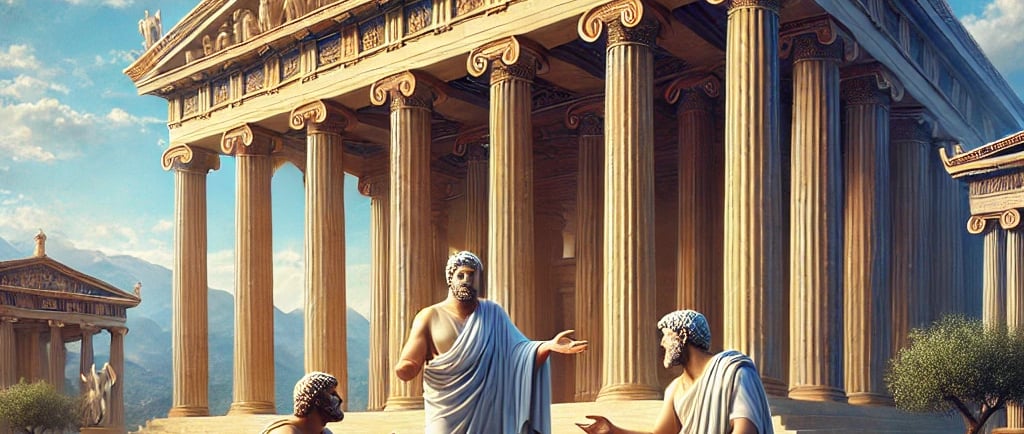Stoicism: The Ancient Philosophy for Modern Life
Why Stoicism Still Matters Today? In an age of uncertainty, stress, and rapid change, people are turning to an ancient philosophy that has guided emperors, leaders, and thinkers for over 2,000 years—Stoicism. But what exactly is Stoicism, and why has it remained so influential throughout history?
LP
3/2/20254 min read


Stoicism: The Ancient Philosophy for Modern Life
Introduction: Why Stoicism Still Matters Today
In an age of uncertainty, stress, and rapid change, people are turning to an ancient philosophy that has guided emperors, leaders, and thinkers for over 2,000 years—Stoicism. But what exactly is Stoicism, and why has it remained so influential throughout history?
Stoicism is more than just a philosophy; it is a way of life that teaches resilience, discipline, and inner peace. It provides a framework for overcoming adversity, controlling emotions, and living according to virtue and reason. The philosophy has influenced great leaders like Marcus Aurelius, Seneca, and Epictetus, and even modern figures such as Theodore Roosevelt, Nelson Mandela, and Warren Buffett.
In this article, we’ll explore:
The origins of Stoicism – Where and how it was born.
The key Stoic philosophers – From Zeno to Marcus Aurelius.
How Stoicism shaped leadership throughout history.
Why Stoicism is more relevant today than ever before.
If you’re looking for a practical guide to self-discipline, resilience, and wisdom, keep reading—Stoicism may just change your life.
1. The Birth of Stoicism: Origins and Philosophy
When and Why Did Stoicism Begin?
Stoicism was founded in Athens around 300 BCE by Zeno of Citium, a merchant from Cyprus who, after losing his wealth in a shipwreck, turned to philosophy in search of meaning. Inspired by Socrates, Plato, and the Cynics, Zeno began teaching in the Stoa Poikile (Painted Porch) in Athens, where Stoicism got its name.
The goal of Stoicism was to help people lead a virtuous, rational, and emotionally resilient life, free from destructive emotions like anger, fear, and anxiety. It taught that we cannot control external events, but we can control our reactions.
The Four Pillars of Stoicism
The Stoic way of life revolves around four cardinal virtues:
Wisdom (Sophia) – Understanding what is truly important and making rational decisions.
Courage (Andreia) – Facing adversity, pain, or fear with strength and confidence.
Justice (Dikaiosyne) – Acting fairly, ethically, and with integrity.
Temperance (Sophrosyne) – Practicing self-control and moderation in desires.
These principles were not just abstract theories, but a practical guide to navigating the chaos of life with dignity and inner peace.
2. The Great Stoic Philosophers: From Zeno to Marcus Aurelius
The Early Stoics
Zeno of Citium (334–262 BCE) – The founder of Stoicism, who believed that living according to nature and reason was the key to happiness.
Cleanthes (330–230 BCE) – Expanded Zeno’s ideas and wrote the Hymn to Zeus, a Stoic prayer praising rational order in the universe.
Chrysippus (279–206 BCE) – Considered the second founder of Stoicism, he systematized Stoic logic and ethics.
The Roman Stoics: Practical Wisdom for Rulers and Thinkers
While Stoicism started in Greece, it flourished in Rome, where it became a philosophy of leadership and self-mastery.
1. Seneca (4 BCE–65 CE) – The Wealthy Stoic
A statesman and advisor to Emperor Nero, Seneca emphasized the power of the mind over external circumstances.
His letters and essays on anger, wealth, and time management remain highly relevant today.
2. Epictetus (55–135 CE) – The Slave Who Became a Teacher
Born a slave, Epictetus gained his freedom and became a philosopher.
His teachings, recorded in the Discourses and Enchiridion, emphasize that happiness comes from controlling our thoughts and reactions, not external circumstances.
One of his famous lessons:
“It’s not what happens to you, but how you react to it that matters.”
3. Marcus Aurelius (121–180 CE) – The Philosopher-Emperor
Marcus Aurelius, the 16th emperor of Rome, was one of the greatest Stoics in history. His personal journal, Meditations, written while leading Rome during wars and plagues, is a powerful guide to resilience, leadership, and wisdom.
Some of his most famous teachings:
"You have power over your mind – not outside events. Realize this, and you will find strength."
"The happiness of your life depends upon the quality of your thoughts."
Marcus proved that Stoicism is not just a philosophy for scholars, but for leaders, warriors, and anyone who faces adversity.
3. How Stoicism Shaped World Leaders
Stoicism has influenced some of the greatest minds in history, including:
✔ Theodore Roosevelt – Practiced Stoic resilience after losing his wife and mother on the same day.
✔ Nelson Mandela – Used Stoic principles to maintain mental strength during 27 years in prison.
✔ Winston Churchill – Applied Stoic courage in the darkest days of World War II.
✔ Warren Buffett – Embodies Stoic self-discipline in financial markets, ignoring fear and panic.
This proves that Stoicism is not just a theory—it is a practical tool for personal and professional success.
4. Why Stoicism Matters Today: A Guide for Modern Life
How Can Stoicism Help You?
In today's world of stress, distractions, and emotional overwhelm, Stoicism offers timeless strategies for:
✅ Managing Stress and Anxiety – Stoicism teaches that we cannot control external events, only our responses.
✅ Overcoming Fear and Failure – Instead of fearing failure, Stoics see it as a teacher.
✅ Living with Purpose – Stoics focus on what truly matters instead of chasing materialistic desires.
✅ Developing Mental Toughness – Stoic practices help build resilience against hardships.
✅ Strengthening Leadership and Decision-Making – By applying logic, reason, and ethics, you become a better leader.
Stoic Practices You Can Start Today
Morning Reflection – Start each day by setting your intentions.
Negative Visualization – Imagine challenges ahead so you’re mentally prepared.
Journaling – Write daily reflections, just like Marcus Aurelius.
Voluntary Discomfort – Occasionally step outside your comfort zone to build resilience.
Mindfulness and Presence – Focus on what you can control and let go of what you cannot.
5. Conclusion: Live Like a Stoic, Lead Like a Leader
Stoicism is not just an ancient philosophy—it’s a powerful tool for living well today. Whether you are an entrepreneur, leader, or simply someone seeking inner peace, Stoicism provides the wisdom to thrive in adversity, manage emotions, and find meaning in life.
If Marcus Aurelius, Seneca, and Epictetus could use Stoicism to navigate wars, plagues, and political chaos, imagine what it can do for you.
Explore More: Get Your Copy of Meditations
Ready to transform your life with Stoic wisdom? Dive into the timeless teachings of Marcus Aurelius with our handpicked edition of Meditations, available now at CenturiesPublisher.com.
✔ Enhance your mental strength
✔ Improve decision-making
✔ Master resilience and inner peace
Start your Stoic journey today! 🚀
Get Previews & News
© 2025. All rights reserved.


